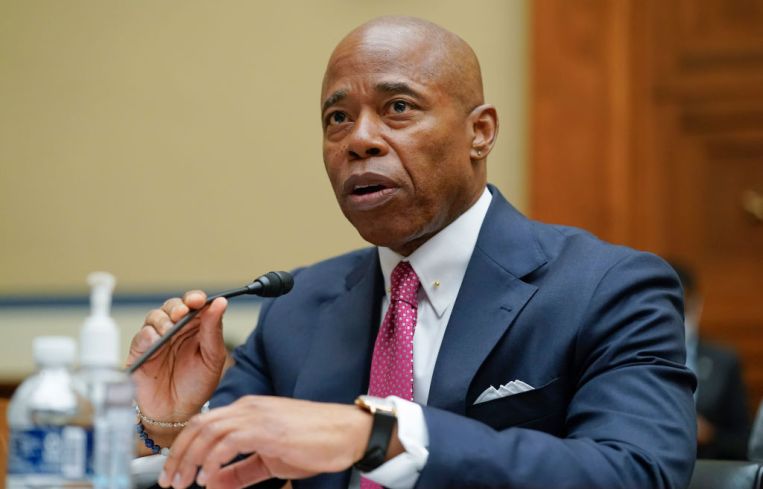Businesses Donate $8M for Homeless Outreach in NYC Office Districts
By Celia Young July 26, 2022 6:02 pm
reprints
More than 60 New York City businesses and real estate organizations donated $8 million to the city in an effort to house the homeless population now living on the streets in office districts, in the hope of easing public safety fears and getting workers back to the office.
The money, dubbed the “Homeless Assistance Fund,” will expand nonprofit Breaking Ground’s outreach to the city’s homeless population. The effort was spearheaded by the Partnership for New York City because one of its recent surveys showed concerns over public safety and homelessness have stymied the return to the office, Mayor Eric Adams announced Tuesday.
“We’re going to restore the sense of confidence and trust in the city and it is crucial for [our] long-term recovery plan,” Adams said. “There is no wall between this administration and the business community. We’re in this together, and together we are going to solve some of these major problems that we are facing.”
The money will fund nearly 100 additional outreach workers from Breaking Ground’s 2-year-old “Connect to Care” program, who will offer housing units from the city and Breaking Ground to those living on the streets. Starting in the fall, Breaking Ground will focus its new efforts on seven initial major transit hubs and dense office districts, including Midtown, Lower Manhattan and Downtown Brooklyn, Brenda Rosen, president and CEO of Breaking Ground, said Tuesday.
Connect to Care will target privately owned spaces such as ATM vestibules, retail stores and private plazas that the city normally cannot reach since it does not own those properties. Breaking Ground will also offer training to workers of companies that are part of the fund on the root causes of homelessness and how to find outreach teams that can help, according to the nonprofit.
The initiative follows the Adams administration’s controversial sweeps of homeless encampments across the city, which drew widespread criticism by advocates but garnered the support of the real estate industry. The city made 1,477 sweeps from March to June, but only 66 people have accepted placement in city housing, according to data provided by the city.
Plenty of big real estate names were among the companies that donated to the initiative, including Tishman Speyer, Related Companies, Fisher Brothers, Blackstone, Newmark, GFP Real Estate, Goldman Sachs, JPMorgan Chase and Cushman & Wakefield. Adams called on even more businesses to fund the program, while promising to examine the New York City Department of Homeless Services’ more than $2 billion budget to ensure it will be spent correctly.
“The city’s business community believes that Connect to Care offers a tangible way to help address a humanitarian crisis that has become larger and more visible during the pandemic and demands a compassionate response from both government and the private sector,” Kathryn Wylde, president and CEO of the Partnership for New York City, said in a statement.
Getting New York City’s workers back into the office has become a priority for the Adams administration and many business leaders, though not a popular one among employees. Many have cited public safety, rather than the ongoing pandemic, as a major concern preventing them from heading back to their cubicles.
Of about 9,000 mostly Manhattan-based workers surveyed in the spring, 61 percent ranked safety as the most important issue to address in New York’s public transit system, with homelessness ranking second, at 15 percent.
Those safety concerns are not totally without merit. In May, the New York City Police Department received 413 reports of crimes on the city subways and buses, an increase from the 364 reports it got during the same month last year, the most recent data available from the NYPD. Overall crime in the city increased 31 percent in June compared to the same month last year, according to NYPD data. Shootings and murders both declined in the first six months of the year compared to the same period in 2021.
While concerns over public safety mount, Yelp, Amazon and Meta’s recent decisions to pull back or cancel their physical office plans have raised fears in commercial real estate that companies might shift to smaller footprints, regardless of crime or the state of the pandemic.
Celia Young can be reached at cyoung@commercialobserver.com.



